2017 年浙江宁波大学翻译硕士英语考研真题
Part I Vocabulary and Grammar (30 points: 20 for Section A, and 10 for Section B)
Section A:
There are 20 incomplete sentences in this section. For each sentence there are four
choices marked A, B, C and D. Choose the ONE answer that best completes the sentence.
1. The directions were so ________ that it was impossible to complete the assignment.
A) ingenious B) ambitious C) notorious D) ambiguous
2. Because a degree from a good university is the means to a better job, education
is one of the most ________ areas in Japanese life.
A) sophisticated B) competitive C) considerate D) superficial
3. If a person talks about his weak points, his listener is expected to say something
in the way of ____.
A) persuasion B) remedy C) encouragement D) compromise
4. Her interest in redecorating the big house kept her ________ for a whole week.
A) constrained B) dominated C) restricted D) occupied
5. If we _____ our relations with that country, we’ll have to find another supplier
of raw materials.
A) diffuse B) diminish C) terminate D) preclude
6. Ever since the first nuclear power stations were built, doubts have ________ about
their safety.
A) preserved B) survived C) suspended D) lingered
7. This clearly shows that crops and weeds have quite a number of ________ in common.
A) traits B) traces C) tracks D) trails
8. From science to Shakespeare, excellent television and video programs are
available ___ to teacher.
A) in effect B) in practice C) in operation D) in abundance
9. When the Italian poet Dante was ________ from his home in Florence, he decided
to walk from Italy to Paris to search for the real meaning of life.
A) exerted B) expired C) exiled D) exempted
10.Habits acquired in youth-notably smoking and drinking-may increase the risk of
____ diseases in a person’s later life.
A) consecutive B) chronic C) critical D) cyclical
11. Please do not be ______ by his bad manners since he is merely trying to attract
attention.
A) disregarded B) distorted C) irritated D) intervened
12.Craig assured his boss that he would ________ all his energies in doing this new
job.
A) call forth B) call at C) call on D) call off
13. Too much ________ to X-rays can cause skin burns, cancer or other damage to the
body.
A) disclosure B) exhibition C) contact D) exposure
14.When confronted with such questions, my mind goes ________, and I can hardly
remember my own date of birth.
�
A) dim B) blank C) faint D) vain
15.It is well known that knowledge is that ________ condition for expansion of mind.
A) incompatible B) incredible C) indefinite D) indispensable
16. More than two hundred years ago the United States ________ from the British Empire
and become an independent country.
A) got off B) pulled down C) broke away D) dropped off
17.Care should be taken to decrease the length of time that one is _______ loud
continuous noise.
A) subjected to B) filled with C) associated with D) attached to
18. Some of the most important concepts in physics ___ their success to these
mathematical systems.
A) oblige B) owe C) contribute D) object
19.As your instructor advised, you ought to spend your time on something ____
researching into.
A) precious B) worth C) worthy D) valuable
20.As a defense against air-pollution damage, many plants and animals ________ a
substance to absorb harmful chemicals.
A) relieve B) release C) dismiss D) discard
Section B:
There are 20 blanks in the following passage. For each blank there are four choices
marked, A, B, C, and D You should choose the ONE that best fits into the passage.
Then mark the corresponding letter on the Answer Sheet with a single line through
the centre. In the nineteenth century, the invention of the telegraph made it
possible to send noises, signals, and even music over wires from one place to another.
(21)______, the human voice had never traveled this way. Many inventors tried to
find a (22)______ to send a voice over wires, and in 1876 some of their (23)______
were crowned with (使圆满结束) success. Two American (24)______, Alexander Graham
Bell and Elisha Gray, (25)______ at almost the same time. The United States
(26)______ Court finally had to decide which of the two (27)______ the first inventor
of the telephone. The Court decided (28)______ Bell's favor. Born in Edinburg,
Scotland, Bell grew up in a family (29)______ was very interested in teaching people
to (30)______. His grandfather had been an actor who left (31)______ to teach
elocution (雄辩 术); his father was a teacher who helped deaf-mutes learn (32)______
to speak. However, probably none of the (33)______ inventions gave Bell the same
feeling of triumph (34)______ he had on the day (35)______ he spilled some acid from
his batteries. It was after he had worked for months (36)______ he found ways to
send something more (37)______ metallic twangs (“嘣”的一声) over the wires.
Thinking Watson, his helper, was in the next room, Bell called, "Mr. Watson,
(38)______. I want you." Watson was not in the next room. He was down in his laboratory,
(39)______ to the receiver. To Watson's (40)______, he heard the words perfectly.
He ran to tell Bell the news: the wires had carried Bell's voice perfectly.
21. A) Therefore B) However C) Still D) Furthermore
22. A) solution B) mean C) way D) aspect
23. A) affects B) profits C) effects D) work
�
24. A) inventors B) discoverers C) producers D) researchers
25. A) succeed B) succeeding C) succeeded D) successful
26. A) Senior B) Supreme C) Superior D) Prior
27. A) was B) were C) being D) is
28. A) at B) in C) to D) of
29. A) that B) where C) who D) when
30. A) talk B) speak C) tell D) say
31. A) a theatre B) theatre C) the theatre D) one theatre
32. A) how B) what C) why D) which
33. A) later B) latter C) lately D) late
34. A) like B) as C) which D) just
35. A) which B) when C) that D) how
36. A) that B) when C) which D) however
37. A) of B) to C) than D) for
38. A) come here B) come up C) go away D) go down
39. A) besides B) beside C) next D) near
40. A) dismay B) surprise C) regret D) amaze
Part II Reading Comprehension (40 points: 2×20)
Direction: There are four passages in this part. Each passage is followed by some
questions. For each of them there are four choices marked A, B, C and D You are
expected to make the best choice. Questions 41 to 45 are based on the following
passage:
Over the past century, all kinds of unfairness and discrimination have been condemned
or made illegal. But one insidious form continues to thrive: alphabetism. This, for
those as yet unaware of such a disadvantage, refers to discrimination against those
whose surnames begin with a letter in the lower half of the alphabet.
It has long been known that a taxi firm called AAAA Cars has a big advantage over
Zodiac Cars when customers thumb through their phone directories. Less well known
is the advantage that Adam Abbott has in life over Zoe Zysman. English names are
fairly evenly spread between the halves of the alphabet. Yet a suspiciously large
number of top people have surnames beginning with letters between A and K.
Thus the American president and vice-president have surnames starting with B and
C respectively; and 26 of George Bush’s predecessors (including his father) had
surnames in the first half of the alphabet against just 16 in the second half. Even
more striking, six of the seven heads of government of the G7 rich countries are
alphabetically advantaged (Berlusconi, Blair, Bush, Chirac, Chrétien and Koizumi).
The world’s three top central bankers (Greenspan, Duisenberg and Hayami) are all
close to the top of the alphabet, even if one of them really uses Japanese characters.
As are the world’s five richest men (Gates, Buffett, Allen, Ellison and Albrecht).
Can this merely be coincidence? One theory, dreamt up in all the spare time enjoyed
by the alphabetically disadvantaged, is that the rot sets in early. At the start
of the first year in infant school, teachers seat pupils alphabetically from the
front, to make it easier to remember their names. So short-sighted Zysman junior
gets stuck in the back row, and is rarely asked the improving questions posed by
�
those insensitive teachers. At the time the alphabetically disadvantaged may think
they have had a lucky escape. Yet the result may be worse qualifications, because
they get less individual attention, as well as less confidence in speaking publicly.
The humiliation continues. At university graduation ceremonies, the ABCs proudly
get their awards first; by the time they reach the Zysmans most people are literally
having a ZZZ. Shortlists for job interviews, election ballot papers, lists of
conference speakers and attendees: all tend to be drawn up alphabetically, and their
recipients lose interest as they plough through them.
41. What does the author intend to illustrate with AAAA cars and Zodiac cars?
A) A kind of overlooked inequality. B) A type of conspicuous bias.
C) A type of personal prejudice. D) A kind of brand discrimination.
42. What can we infer from the first three paragraphs?
A) In both East and West, names are essential to success.
B) The alphabet is to blame for the failure of Zoe Zysman.
C) Customers often pay a lot of attention to companies’ names.
D) Some form of discrimination is too subtle to recognize.
43. The 4th paragraph suggests that _______.
A) questions are often put to the more intelligent students.
B) alphabetically disadvantaged students often escape from class.
C) teachers should pay attention to all of their students.
D) students should be seated according to their eyesight.
44. What does the author mean by “most people are literally having a ZZZ” (Lines
2-3, Paragraph 5)?
A) They are getting impatient. B) They are noisily dozing off.
C) They are feeling humiliated D) They are busy with word puzzles.
45. Which of the following is true according to the text?
A) People with surnames beginning with N to Z are often ill-treated
B) VIPs in the Western world gain a great deal from alphabetism.
C) The campaign to eliminate alphabetism still has a long way to go.
D) Putting things alphabetically may lead to unintentional bias.
Questions 46 to 50 are based on the following passage:
At the Massachusetts Institute of Technology, researchers are working on a project
they call "the last book."
This may sound bad to book lovers. After all, MIT devotes itself mainly to computers.
Looking at a computer means reading a screen, which is decidedly not the way most
people want to read a book, particularly the last one.
Reading text on a computer screen is limiting and tiresome. You can't see where you
are or how far you have to go. You can't turn the pages quickly without reading much
to compare parts of the text or to see what your eye finds freely.
You can't comfortably carry a computer screen around with you, to bed, to the beach,
or to the bathroom. You can't collect computer screens, or cover them beautifully,
or place them on bookshelves in the way the English writer Anthony Powell described
in his book.
But hold everything! The news is far from bad. The book of the future described to
�
me on a visit to MIT is really a book, just like any other. It has a cover that could
be made of anything you want, and hundreds of pages you can turn one at a time or
turn over quickly.
The key to this book is something called electronic ink, or e-ink, which can be added
to the page from within instead of by a press. It was developed by Joseph Jacobson,
an assistant professor at MIT.
As the capacity of the book's memory grows, whole libraries may be added. Jacobson
predicts that this book is able to store the entire U.S. Library of Congress, whose
holdings number more than 17 million books.
Yet the book would still have the familiar advantages of a book, Jacobson says. You
could turn off its power and carry it anywhere.
Jacobson greatly admires the usual book. "After all," he added, "if books had been
invented after the computer, they would have been considered a big breakthrough.
They run on very low power at a very low cost."
Every book ever published in a single copy? Will this really happen? How soon could
the last book be available? "A first model of it with just a few pages could be put
together in two to three years, with one of 400 pages taking a year or two longer,"
Jacobson said.
How much will it cost? Jacobson says the final book will probably sell for $2 to
$4 for each reusable page or $500 to $1,000 for a book, although he is working on
ways to reduce costs further.
Will books no longer equip a room? It looks as if they won't, though people will
continue to collect old-fashioned books.
46. In the third sentence of Paragraph 2 the word "decidedly" means ________.
A) certainly B) importantly C) necessarily D) easily
47. One can imagine that in his book, the English writer Anthony Powell described
a book as ____.
A) a thing of beauty B) a piece of bread C) a valuable thing D) a waste
48. The sentence "But hold everything!" in Paragraph 4 means "________".
A) Please try to get everything B) Please don't not jump to conclusions
C) Please have a look at everything D) Please control yourself
49. In what sense is the last book different from regular books?
A) It has no pages. B) It has no ink.
C) It can't be carried to whatever place you like. D) It has memory.
50. Which of the following is True according to the passage?
A) The last book is much more expensive than a regular book.
B) Regular books will be thrown away as garbage.
C) The last book is no match for the regular book.
D) Relatively, it takes a longer time to publish a last book
Questions 51 to 55 are based on the following passage:
The use of deferential language is symbolic of the Confucian ideal of the woman,
which dominates conservative gender norms in Japan. This ideal presents a woman who
withdraws quietly to the background, subordinating her life and needs to those of
her family and its male head. She is a dutiful daughter, wife, and mother, master
�
of the domestic arts. The typical refined Japanese woman excels in modesty and
delicacy; she “treads softly in the world,” elevating feminine beauty and grace
to an art form.
Nowadays, it is commonly observed that young women are not conforming to the feminine
linguistic ideal. They are using fewer of the very deferential “women’s” forms,
and even using the few strong forms that are know as “men’s.” This, of course,
attracts considerable attention and has led to an outcry in the Japanese media
against the defeminization of women’s language. Indeed, we didn’t hear about
“men’s language” until people began to respond to girls’ appropriation of forms
normally reserved for boys and men. There is considerable sentiment about the
“corruption” of women’s language—which of course is viewed as part of the loss
of feminine ideals and morality—and this sentiment is crystallized by nationwide
opinion polls that are regularly carried out by the media.
Yoshiko Matsumoto has argued that young women probably never used as many of the
highly deferential forms as older women. This highly polite style is no doubt
something that young women have been expected to “grow into”—after all, it is
assign not simply of femininity, but of maturity and refinement, and its use could
be taken to indicate a change in the nature of one’s social relations as well. One
might well imagine little girls using exceedingly polite forms when playing house
or imitating older women—in a fashion analogous to little girls’ use of a
high-pitched voice to do “teacher talk” or “mother talk” in role play.
The fact that young Japanese women are using less deferential language is a sure
sign of change—of social change and of linguistic change. But it is most certainly
not a sign of the “masculization” of girls. In some instances, it may be a sign
that girls are making the same claim to authority as boys and men, but that is very
different from saying that they are trying to be “masculine.” Katsue Reynolds has
argued that girls nowadays are using more assertive language strategies in order
to be able to compete with boys in schools and out. Social change also brings not
simply different positions for women and girls, but different relations to life
stages, and adolescent girls are participating in new subcultural forms. Thus what
may, to an older speaker, seem like “masculine” speech may seem to an adolescent
like “liberated” or “hip” speech.
51. The first paragraph describes in detail ________.
A) the standards set for contemporary Japanese women
B) the Confucian influence on gender norms in Japan
C) the stereotyped role of women in Japanese families
D) the norms for traditional Japanese women to follow
52. What change has been observed in today’s young Japanese women?
A) They pay less attention to their linguistic behavior.
B) The use fewer of the deferential linguistic forms.
C) They confuse male and female forms of language.
D) They employ very strong linguistic expressions.
53. How do some people react to women’s appropriation of men’s language forms as
reported in the Japanese media?
�
A) They call for a campaign to stop the defeminization.
B) The see it as an expression of women’s sentiment.
C) They accept it as a modern trend.
D) They express strong disapproval.
54. According to Yoshiko Matsumoto, the linguistic behavior observed in today’s
young women ___.
A) may lead to changes in social relations B) has been true of all past generations
C) is viewed as a sign of their maturity D) is a result of rapid social progress
55. The author believes that the use of assertive language by young Japanese women
is ________.
A) a sure sign of their defeminization and maturation
B) an indication of their defiance against social change
C) one of their strategies to compete in a male-dominated society
D) an inevitable trend of linguistic development in Japan today
Questions 56 to 60 are based on the following passage:
The appeal of advertising to buying motives can have both negative and positive
effects consumers may be convinced to buy a product of poor quality or high price
because of an advertisement. For example, some advertisers have appealed to
people’s desire for better fuel economy for their cars by advertising automotive
products that improve gasoline mileage. Some of the products work. Others are
worthless and a waste of consumers’ money.
Sometimes advertising is intentionally misleading. A few years ago a brand of bread
was offer to dieters with the message that there were fewer calories in every slice.
It turned out that the bread was not dietetic, but just regular bread. There were
fewer calories because it was sliced very thin, but there were the same number of
calories in every loaf.
On the positive side, emotional appeals may respond to a consumer’s real concerns.
Consider fire insurance. Fire insurance may be sold by appealing to fear of loss.
But fear of loss is the real reason for fire insurance. The security of knowing that
property is protected by insurance makes the purchase of fire insurance a worthwhile
investment for most people. If consumers consider the quality of the insurance plans
as well as the message in the ads, they will benefit from the advertising.
Each consumer must evaluate her or his own situation. Are the benefits of the product
important enough to justify buying it? Advertising is intended to appeal to consumers,
but it does not force them to buy the product. Consumers still control the final
buying decision.
56. Advertising can persuade the consumer to buy worthless products by ________.
A) stressing their high quality B) convincing him of their low price
C) maintaining a balance between quality and price D) appealing to his buying motives
57. The reason why the bread advertisement is misleading is that ________.
A) thin slices of bread could contain more calories
B) the loaf was cut into regular slices
C) the bread was not genuine bread
D) the total number of calories in the loaf remained the same
�
58. The passage tells us that ________.
A) sometimes advertisements really sell what the consumer needs
B) advertisements occasionally force consumers into buying things they don’t need
C) the buying motives of consumers are controlled by advertisements
D) fire insurance is seldom a worthwhile investment
59. It can be inferred from the passage that a smart consumer should ________.
A) think carefully about the benefits described in the advertisements
B) guard against the deceiving nature of advertisements
C) be familiar with various advertising strategies
D) avoid buying products that have strong emotional appeal
60. The passage is mainly about ________.
A) how to make a wise buying decision
B) ways to protect the interests of the consumer
C) the positive and negative aspects of advertising
D) the function of advertisements in promoting sales
Part III Writing (30 points)
Directions: Based on the information given below, please write an essay of about
600 words on the Answer Sheet. You have 60 minutes to plan, write, and revise your
essay.
Some people think that universities should provide knowledge and skills related to
future career. Others think the true function of the university is to give access
to knowledge for its own sake. What is your opinion?
Suggested title for the essay is:
The University’s Function
You may use your own title if you like.
�
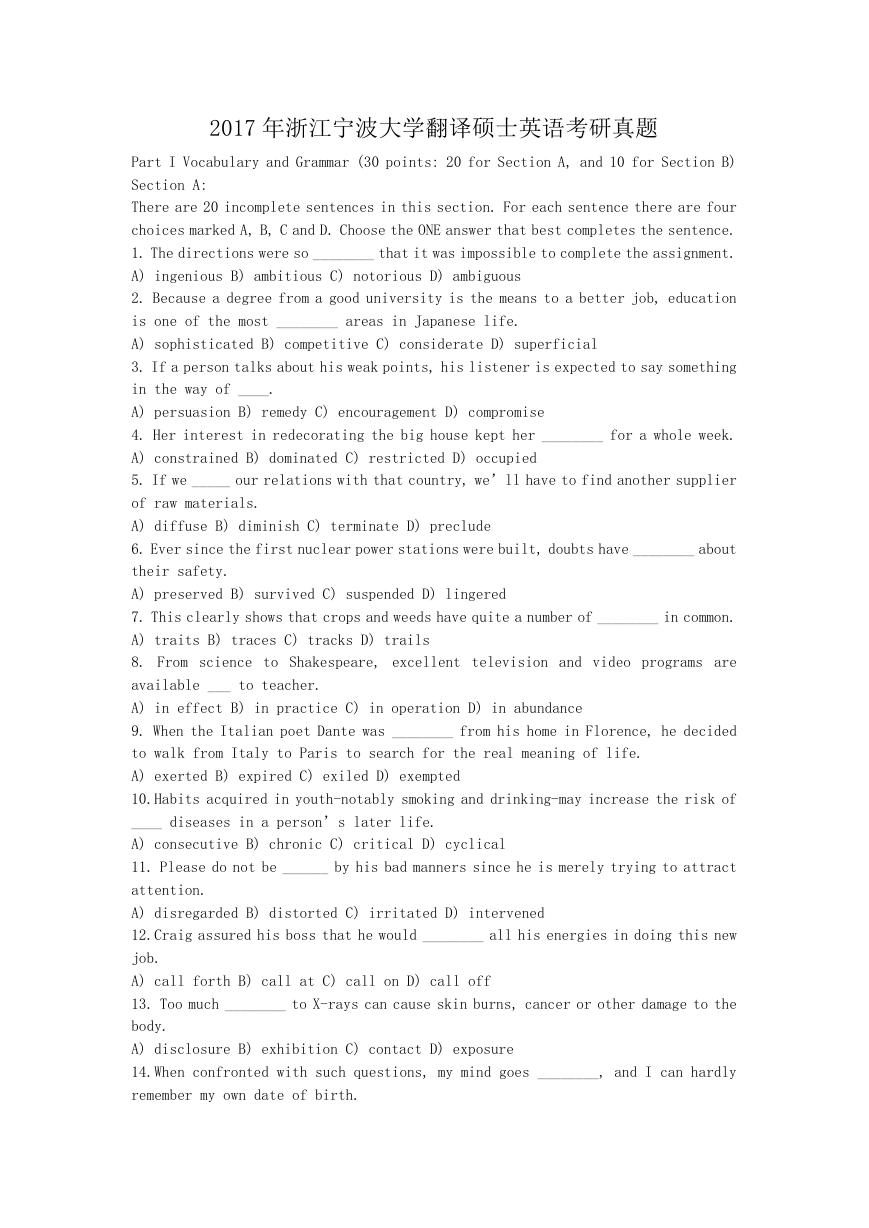

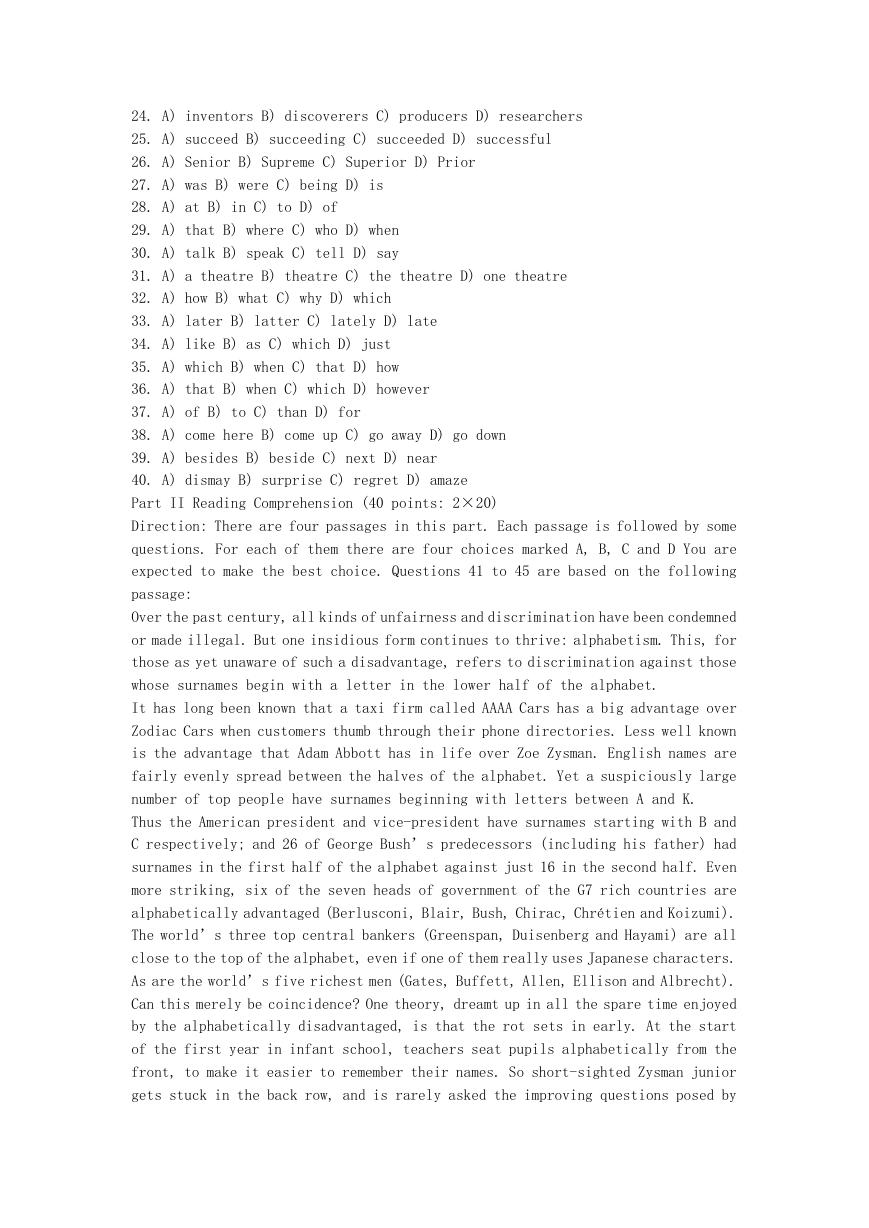

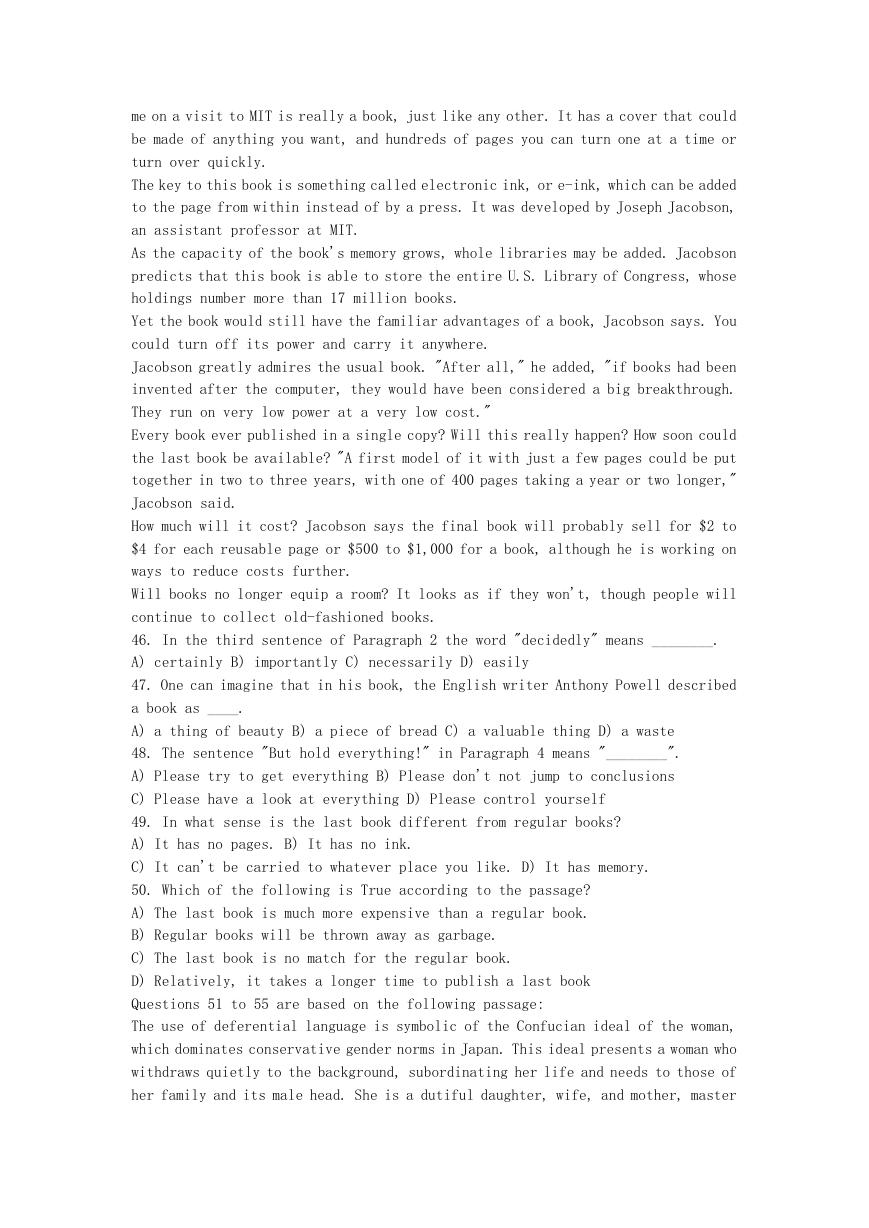
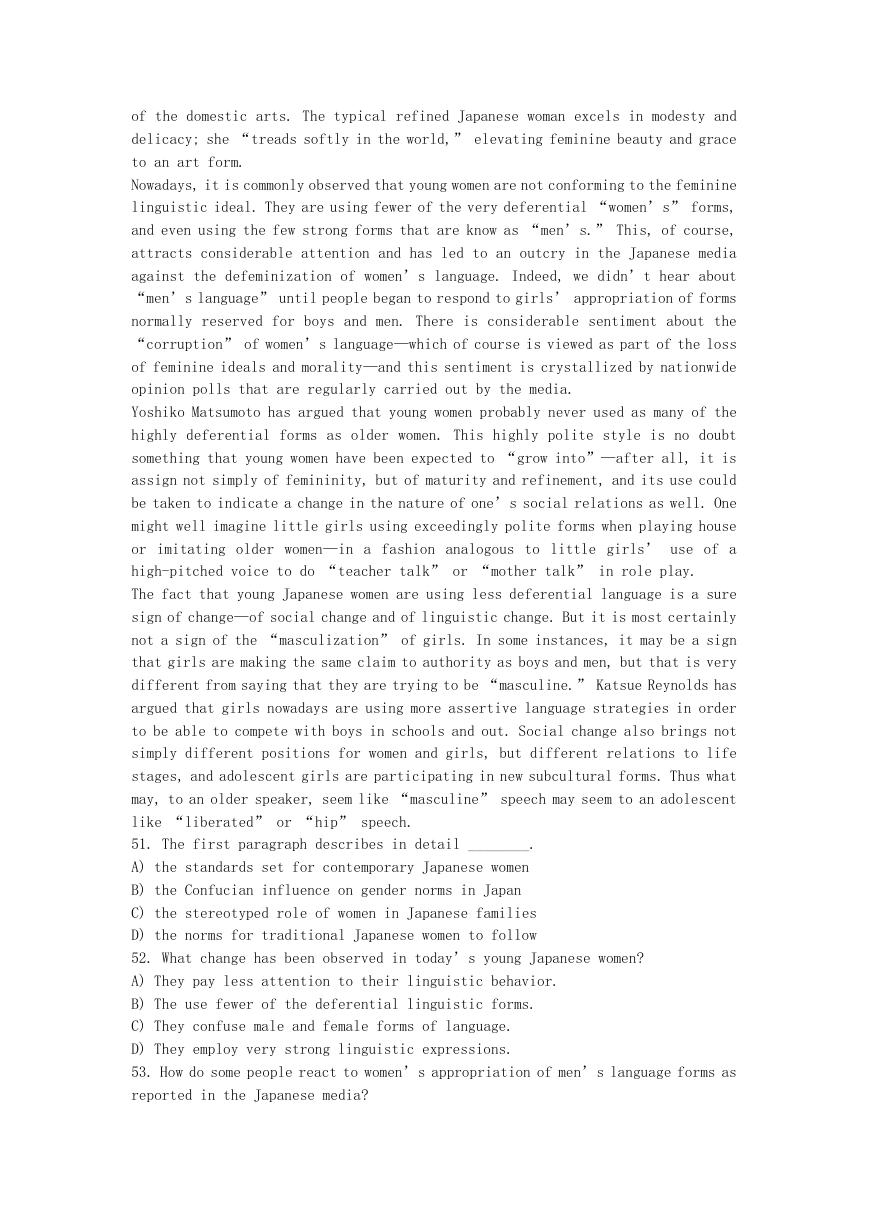
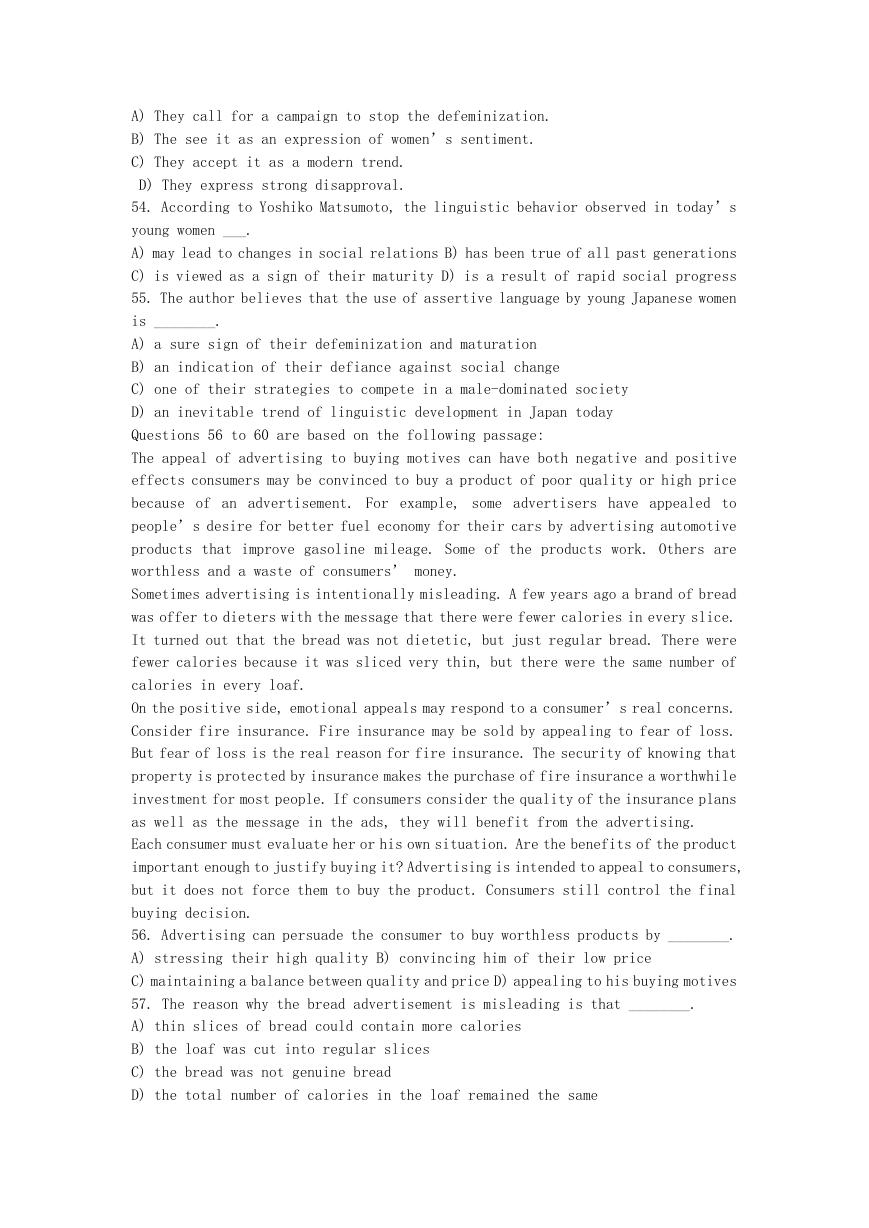









 2023年江西萍乡中考道德与法治真题及答案.doc
2023年江西萍乡中考道德与法治真题及答案.doc 2012年重庆南川中考生物真题及答案.doc
2012年重庆南川中考生物真题及答案.doc 2013年江西师范大学地理学综合及文艺理论基础考研真题.doc
2013年江西师范大学地理学综合及文艺理论基础考研真题.doc 2020年四川甘孜小升初语文真题及答案I卷.doc
2020年四川甘孜小升初语文真题及答案I卷.doc 2020年注册岩土工程师专业基础考试真题及答案.doc
2020年注册岩土工程师专业基础考试真题及答案.doc 2023-2024学年福建省厦门市九年级上学期数学月考试题及答案.doc
2023-2024学年福建省厦门市九年级上学期数学月考试题及答案.doc 2021-2022学年辽宁省沈阳市大东区九年级上学期语文期末试题及答案.doc
2021-2022学年辽宁省沈阳市大东区九年级上学期语文期末试题及答案.doc 2022-2023学年北京东城区初三第一学期物理期末试卷及答案.doc
2022-2023学年北京东城区初三第一学期物理期末试卷及答案.doc 2018上半年江西教师资格初中地理学科知识与教学能力真题及答案.doc
2018上半年江西教师资格初中地理学科知识与教学能力真题及答案.doc 2012年河北国家公务员申论考试真题及答案-省级.doc
2012年河北国家公务员申论考试真题及答案-省级.doc 2020-2021学年江苏省扬州市江都区邵樊片九年级上学期数学第一次质量检测试题及答案.doc
2020-2021学年江苏省扬州市江都区邵樊片九年级上学期数学第一次质量检测试题及答案.doc 2022下半年黑龙江教师资格证中学综合素质真题及答案.doc
2022下半年黑龙江教师资格证中学综合素质真题及答案.doc